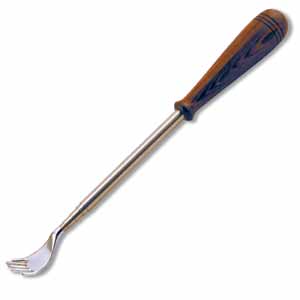

Hildabeast/Obama is gonna take a lot of scratching........
**** scratching an itch temporarily shuts off areas in the brain linked with unpleasant feelings and memories. ****
Try that with a tick or chigger bite!
Reading this article makes me itch!
I wouldn't count on this study having much lasting value. This article calls the brush a “soft brush.” Others use “small brush.” The study itself said:
Scratching stimulus
Scratching was accomplished by study personnel repetitively moving a cytology brush (Medi-Pak 7-inch cytology brush; General Medical Corporation, Elkridge, MD) over the left leg. Uniformity was controlled by applying sufficient pressure to bend skin-facing brush bristles, so that the brush handle touched the skin surface. The bending force of the cytology brush was equivalent to approximately 29 g on a digital scale....
Each examinee underwent a training session in which study personnel applied the cytology brush. The examinee was asked whether the procedure was similar to their experience when they scratch their skin. All subjects reported that they perceived this procedure as closely simulating scratching.
http://www.nature.com/jid/journal/vaop/ncurrent/full/jid20083a.html
Now, if they had used the ENDS of the bristles, AND if the bristles were stiff, that would have simulated scratching. But they didn't. They used the SIDE of the bristles. The ends of the bristles would have contributed little to the “scratching.” They also “..touched the skin's surface...” with the “brush handle.”
Perhaps the brush handle touching the skin MIGHT have simulated “scratching,” the SIDE of the bristles could not, whether the bristles were stiff or soft. So then, why did the examinees report that it DID “simulate scratching?”
Put yourself in their place: You are a college student who needs the pittance offered to take part in an experiment. The big deal itch expert professor asks if it feels like scratching. If you say “no,” you (imagine that) you will annoy a professor, you imagine a $20 bill sprouting wings and flying out the window. It is not difficult to imagine that the examinee would not be completely candid.
Thus, the actual finding of this study is that sliding the side of the bristles of a cytology brush on skin (which is NOT experiencing itching) apparently causes activation and deactivation of certain parts of the brain. I think that it has no correlation with scratching an actual itch.
DG